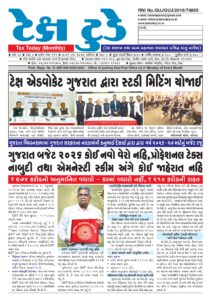GST WEEKLY UPDATE : 24/2021-22 (12.09.2021) By CA Vipul Khandhar

By CA Vipul Khandhar
- CBIC issues clarification on Extension of Time Limit to apply for Revocation of Cancellation of GST Registration:
- The Central Board of Indirect Taxes and Customs issued the clarification regarding extension of time limit to apply for revocation of cancellation of registration. The date for filing application for revocation of cancellation of registration in all cases is extended to 30th September, 2021.
- In case where the application for revocation of cancellation of registration has not been filed by the taxpayer, the applications for revocation can be filed upto the extended timelines as provided vide the said notification.
- where an appeal was filed against order of cancellation of registration and the appeal had been rejected. Where the application for revocation of cancellation of registration has already been filed and which are pending with the proper officer, the officer shall process the application for revocation considering the extended timelines as provided vide the said notification.
- Furthermore, where the application for revocation of cancellation of registration was filed, but was rejected by the proper officer and taxpayer has not filed any appeal against the rejection, taxpayer may file a fresh application for revocation and the officer shall process the application for revocation considering the extended timelines as provided vide the said notification.
- The application for revocation of cancellation of registration was filed, the proper officer rejected the application and appeal against the rejection order is pending before appellate authority, appellate authorities shall take the cognizance of the said notification for extension of timelines while deciding the appeal.
- Where the application for revocation of cancellation of registration was filed, the proper officer rejected the application and the appeal has been decided against the taxpayer, he may file a fresh application for revocation and the officer shall process the application for revocation considering the extended timelines as provided vide the said notification.
- It was clarified that where the thirty days’ time limit falls between 1st March, 2020 to 31st December, 2020, there is no provision available to extend the said time period of 30 days under section 30 of the CGST Act. For such cases, pursuant to the said notification, the time limit to apply for revocation of cancellation of registration stands extended up to 30th September, 2021 only.
- where the time period of thirty days since cancellation of registration has not lapsed as on 1st January, 2021 or where the registration has been cancelled on or after 1st January, 2021, the time limit for applying for revocation of cancellation of registration shall stand extended.
- Where the time period of 90 days (initial 30 days and extension of 30 + 30 days) since cancellation of registration has elapsed by 31.08.2021, the time limit to apply for revocation of cancellation of registration stands extended upto 30th September 2021.
- CBIC reminds GST Taxpayers, E-Commerce Operators who Deduct TDS to file GSTR-7 or GSTR-8 Return for Aug, 2021:
- The Central Board of Indirect Taxes and Customs reminded the GST Taxpayers and E-Commerce Operators who Deduct TDS to file GSTR-7 and GSTR-8 Return respectively for August, 2021 by September 10, 2021. GSTR-7 is a monthly return to be filed by the persons required to deduct Tax Deducted at Source (TDS) under the Goods and Services Tax (GST).
- GSTR-8 is a monthly return to be filed by e-commerce operators registered under the GST.
- If the GST return is not filed on time, then a penalty of Rs.100 under CGST and Rs.100 under SGST shall be levied, and the total will be Rs.200 per day. However, the maximum late fee should not exceed Rs 5,000. There is no late fee on IGST in case of delayed filing. Along with late fees, interest has to be paid at 18% per annum.
- CENTRE has revised “Transport and Marketing Assistance” (TMA) scheme for Specified Agriculture Products’:
- The Department of Commerce had introduced ‘Transport and Marketing Assistance (TMA) for Specified Agriculture Products Scheme’ to provide assistance for the international component of freight, to mitigate disadvantage of higher freight costs faced by the Indian exporters of agriculture products.
- The Department has notified ‘Revised Transport and Marketing Assistance (TMA) for Specified Agriculture Products Scheme’ for exports effected on or after 01.04.2021 up to 31.03.2022.
- Following major changes have been made in the revised scheme:
- Dairy products, which were not covered under the earlier scheme, will be eligible for assistance under the revised scheme.
- Rates of assistance have been increased, by 50% for exports by sea and by 100% for exports by air.
- Government amended ‘import duty rate benefit’ on palm oil, soya-bean oil, Sunflower seed oil, etc
Notification No. 34/2021-Customs dated June 29, 2021 (“exemption notification”) as amended by Notification No. 40/2021-Customs dated August 19, 2021 exempted following categories of goods (“specified goods”) from payment of import duty in excess of the standard rate specified in the corresponding entry in column (4) of the below table:
| S. No. | Chapter, heading, sub-heading or tariff item | Description | Standard Rate |
| (1) | (2) | (3) | (4) |
| 1. | 1511 10 00 | Crude Palm Oil | 10% |
| 2. | 1511 90 | All goods (RBD Palm Oil, RBD Palmolein, RBD Palm Stearin and any Palm Oil other than Crude Palm Oil) | 37.5% |
| 3. | 1507 10 00 | All goods | 7.5% |
| 4. | 1507 90 10 | All goods | 37.5% |
| 5. | 1512 11 10 | All goods | 7.5% |
| 6. | 1512 19 10 | All goods | 37.5% |
Notification:
Now, vide Notification No. 43/2021-Customs dated September 10, 2021 the Government has rescinded the exemption notification as mentioned above. Meaning thereby, the specified goods may be taxed at applicable rate of basic duty of customs as leviable thereon under the First Schedule of Customs Tariff Act, 1975.
- Recent AAR & Judicial Decisions:-
(i) Decision of Supreme Court Regarding Writ Petition in High Court not maintainable If Statutory Alternative Remedy is available under CGST Act:
The Supreme Court while allowing the appeal of the revenue ruled that the Writ petition in High Court is not maintainable if statutory alternative remedy is available under CGST Act. The respondent, M/s Commercial Steel Ltd. is a proprietary concern engaged in the business of iron and steel and is registered under the Central Goods and Services Tax Act 2017 and has been allotted a GST code. The respondent purchased certain goods from a dealer, JSW Steel Limited under a tax invoice. The consignment of goods was being carried in a truck. While it was proceeding from the State of Karnataka, it was intercepted on 12 December 2019 at 5.30 pm at Jeedimetala. The tax invoice indicated that the goods were earmarked for delivery at Balanagar, Telangana. The case of the appellants is that Balanagar is situated between the State of Karnataka and Jeedimetala and that no reasonable person would cross Balanagar and then turn around to go back to the place of destination. The purchase value of the goods appeared to be in the amount of Rs.11,14, 579 from the tax invoices. The Telangana High Court in the exercise of its writ jurisdiction under Article 226 of the Constitution set aside the action of the appellants in collecting an amount of Rs.4,16,447 from the respondent towards tax and penalty under the Central Goods and Services Tax Act 2017 (CGST) and State Goods and Services Tax Act (SGST) and directed a refund together with interest at the rate of 6% per annum from 13 December 2019. A further direction has been issued to the State of Telangana to consider initiating disciplinary proceedings against the Assistant Commissioner. The three judge bench of Justice D.Y.Chandrachud, Justice Vikram Nath and Justice Hima Kholi while setting aside the high court’s order ruled that the assessee-respondent had a statutory remedy under Section 107 of the CGST Act. Instead of availing of the remedy, the respondent instituted a petition under Article 226. Although the existence of an alternate remedy is not an absolute bar to the maintainability of a writ petition under Article 226 of the Constitution, a writ petition can be entertained in certain exceptional circumstances. The bench noted that in the present case, none of those exceptions was established further, there was no violation of the principles of natural justice since a notice was served on the person in charge of the conveyance. In this backdrop, it was not appropriate for the High Court to entertain a writ petition. The assessment of facts would have to be carried out by the appellate authority. However, the Apex court said that this shall not preclude the respondent from taking recourse to appropriate remedies which are available in terms of Section 107 to pursue the grievance in regard to the action adopted by the state in the present case. The Apex Court has heard Advocate Prashant Tyagi on behalf of the petitioner and Advocate Shaik Mohamad Hanif for the respondent.
(ii) AAR On ITC not allowable on Invoices for period of Jan to March-2020 for which Supplier has furnished FORM GSTR-1, FORM GSTR-3B:
(Applicant – Eastern Coalfields Ltd)
The West Bengal Authority of Advance Ruling ruled that the Input Tax Credit (ITC) not allowable on invoices for the period of January to March-2020 for which supplier has furnished FORM GSTR-1 and FORM GSTR-3B. The applicant, Eastern Coalfields Ltd is a producer and supplier of coal and has received services from M/s Gayatri Projects Ltd and has availed of input tax credit during the tax periods January 2020, February 2020 and March 2020 respectively against 3 invoices issued by the said supplier of services. Payments against such supplies have also been made by the applicant. The applicant has sought the advance ruling on the issue whether the applicant is entitled for input tax credit already claimed by him on the invoices raised by M/s Gayatri Projects Ltd. pertaining to the period Jan-2020, Feb-2020 and March-2020 for which the supplier has actually paid the tax charged in respect of such supply to the Government, either in cash or through utilization of input tax credit admissible in respect of such supply. Yet another issue raised was whether the applicant has to reverse the said ITC already availed by him where M/s Gayatri Project Ltd. has actually paid the tax, though belatedly and fulfilled the responsibility cast upon them by Section 16(2)(c) of CGST Act, 2017 and all other conditions as mentioned in Section 16(2)(a), 16(2)(b), and 16(2)(d) are fulfilled by the applicant. The coram of members Brajesh Kumar Singh and Joyjit Banik ruled that the applicant is not entitled for input tax credit claimed by him on the invoices raised by M/s Gayatri Projects Ltd. pertaining to the period Jan-2020, Feb-2020 and March-2020 for which the supplier has furnished FORM GSTR-1 and FORM GSTR-3B in the month of November’20 and the applicant is, therefore, required to reverse the said input tax credit.
(iii) AAR On ITC not allowable on Expired Cakes & Pastries and Needs to be Reversed:
(Applicant – M/s. Kanayalal Pahilajrai Balwani)
The Gujarat Authority of Advance Ruling (AAR) ruled that Input Tax Credit (ITC) is not allowable on expired cakes & pastries and needs to be reversed. The applicant, M/s. Kanayalal Pahilajrai Balwani has been engaged in the business of manufacturing & distributing cakes & pastries items. The applicant sends cakes & pastries to the distributors to keep them on display to fascinate consumers. The cakes & pastries are of perishable nature and cannot be preserved for a longer period and on regular intervals, all cakes & pastries kept in the display have to be compulsorily replaced after the expiry of said bakery item. The applicant submits that display assists them to achieve the objectives of continuing to conduct the business of manufacturing and selling cakes & pastries in future also. The applicant has sought the advance ruling on the issue in respect of admissibility of an input tax credit of tax paid or deemed to have been paid. The Coram of Sanjay Saxena and Arun Richard ruled that the manufacturers of perished or expired cakes should reverse any ITC that they may have availed on the inputs or ingredients used in the manufacturing of such cakes. The AAR has given the ruling in the light of the provision of circular dated October 26, 2018, which prescribed “where the time expired goods, which have been returned by the retailer/wholesaler, are destroyed by the manufacturer, he/she is required to reverse the ITC attributable to the manufacture of such goods.” “We hold the act of throwing away expired cakes and pastries is akin to destroying the expired food products, for the applicant destroys by throwing them away,” the AAR said while holding this scenario is similar to treatment of expiry drugs.
Disclaimer:
This publication contains information for general guidance only. It is not intended to address the circumstances of any particular individual or entity. Although the best of endeavour has been made to provide the provisions in a simpler and accurate form, there is no substitute to detailed research with regard to the specific situation of a particular individual or entity. We do not accept any responsibility for loss incurred by any person for acting or refraining to act as a result of any matter in this publication.
(Author is a well known Chartered Accountant practicing at Ahmedabad)





